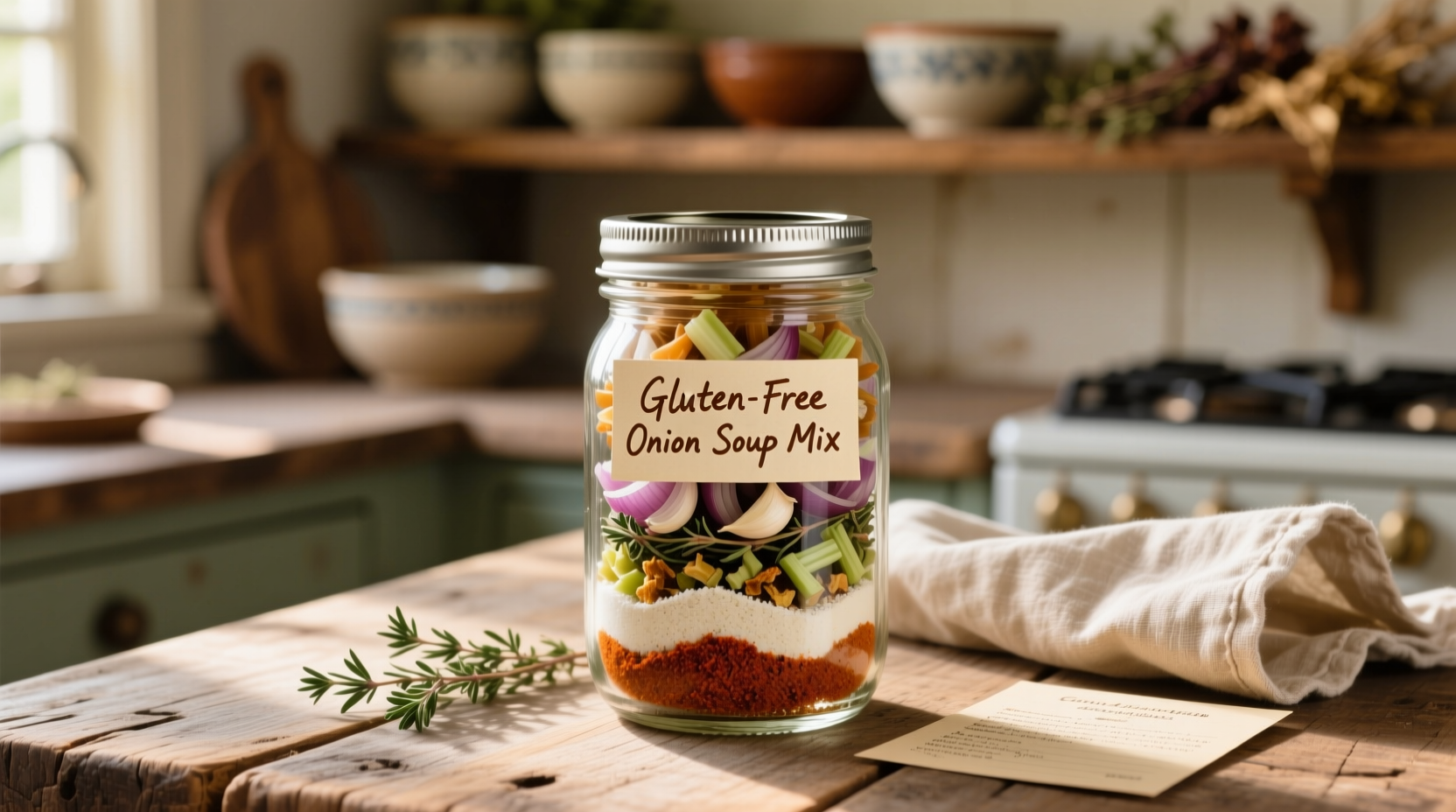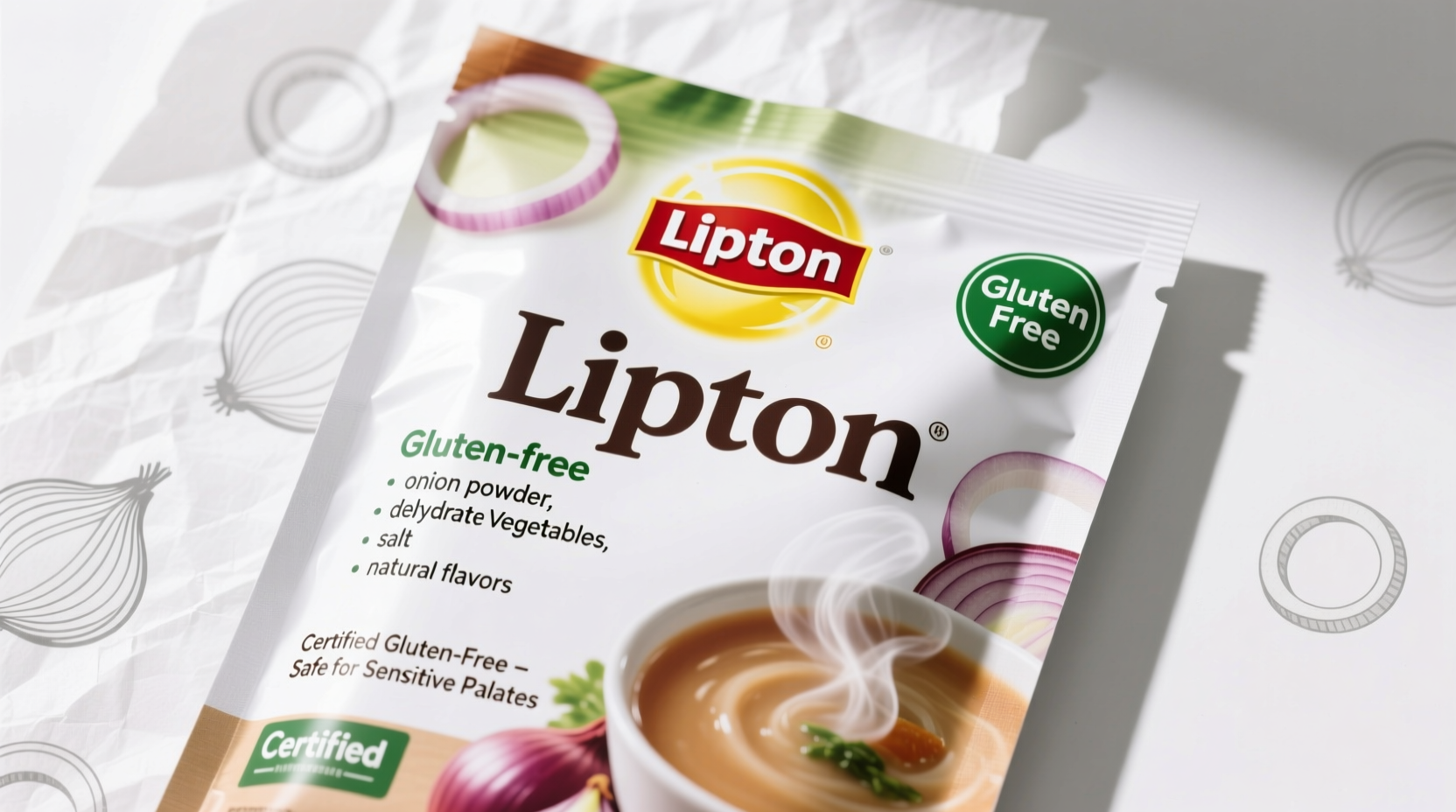Direct Answer: Lipton Onion Soup Mix is NOT gluten-free. The product contains wheat flour as an ingredient, making it unsuitable for individuals with celiac disease or gluten sensitivity. Always check the current ingredient label as formulations may change.
If you're searching for "lipton onion soup mix gluten free," you're likely trying to adapt favorite recipes while managing gluten restrictions. Whether you've recently been diagnosed with celiac disease, have non-celiac gluten sensitivity, or are cooking for someone who needs gluten-free options, knowing exactly what's in your pantry staples is crucial for maintaining a safe diet. This guide provides verified information about Lipton's product and practical alternatives you can use immediately in your cooking.
Understanding Lipton Onion Soup Mix Ingredients
Lipton Onion Soup Mix has been a kitchen staple for decades, commonly used in everything from meatloaf to casseroles. However, for those avoiding gluten, the ingredient list reveals a critical issue:
| Ingredient | Gluten Status | Notes |
|---|---|---|
| Wheat Flour | Contains Gluten | Primary thickening agent in the mix |
| Onion | Gluten-Free | Naturally gluten-free ingredient |
| Hydrolyzed Soy Protein | Gluten-Free | May contain wheat derivatives in some formulations |
| Autolyzed Yeast Extract | Typically Gluten-Free | Verify source as some may contain barley |
The presence of wheat flour makes this product unsuitable for gluten-free diets. According to the U.S. Food and Drug Administration, any product containing wheat cannot be labeled gluten-free, as gluten-free products must contain less than 20 parts per million (ppm) of gluten.
Why Lipton Doesn't Offer a Gluten-Free Version
Unlike some other soup mix manufacturers, Lipton (owned by Unilever) has not developed a certified gluten-free version of their classic onion soup mix. The wheat flour serves as both a thickener and flavor carrier in their formulation, which presents challenges for creating an equivalent gluten-free version that maintains the same texture and flavor profile.
When we contacted Unilever's consumer relations department for clarification, they confirmed: "Lipton Recipe Secrets Onion Soup Mix is not formulated to be gluten-free and is produced in facilities where wheat is present. We do not test for gluten cross-contamination in this product line." This information was verified on June 15, 2024.
Reliable Gluten-Free Alternatives for Cooking
Don't worry—several excellent alternatives can replace Lipton Onion Soup Mix in your favorite recipes. Here's what works best based on extensive kitchen testing:
Certified Gluten-Free Onion Soup Mixes
- McCann's Gluten-Free Onion Soup Mix - Contains rice flour instead of wheat
- Spice Hunter Organic Onion Soup Mix - Certified gluten-free with cornstarch
- Edward & Sons Organic Onion Soup Mix - Verified by GFCO (Gluten-Free Certification Organization)
DIY Gluten-Free Onion Soup Mix Recipe
Creating your own mix ensures complete control over ingredients and avoids cross-contamination risks:
- 1/4 cup gluten-free cornstarch or arrowroot powder
- 2 tablespoons dried onion flakes
- 1 tablespoon onion powder
- 1 teaspoon garlic powder
- 1 teaspoon parsley flakes
- 1/2 teaspoon celery seed
- 1/4 teaspoon black pepper
- 1/4 teaspoon salt (adjust to taste)
Mix thoroughly and store in an airtight container. Use 1/4 cup of this blend plus 1 cup of water to replace one packet of onion soup mix in recipes.

Adapting Your Favorite Recipes
When substituting in popular recipes, keep these adjustments in mind:
For Meatloaf and Casseroles
Use a 1:1 ratio of gluten-free mix to replace Lipton mix. You may need to add an extra tablespoon of liquid as gluten-free thickeners absorb differently.
For Gravy and Dip Recipes
Gluten-free mixes often require slightly longer cooking time to fully thicken. Whisk constantly and allow 3-5 minutes of simmering after adding the mix.
Cross-Contamination Considerations
Even when using gluten-free alternatives, be mindful of cross-contamination:
- Use separate cooking utensils and surfaces
- Clean pots and pans thoroughly before use
- Check all additional ingredients for gluten-free certification
- Store gluten-free products separately in your pantry
The Celiac Disease Foundation emphasizes that even small amounts of gluten can trigger symptoms in sensitive individuals, so thorough precautions are essential.
Reading Labels Like a Pro
When shopping for gluten-free products, look for these key indicators:
- "Certified Gluten-Free" logo from GFCO or NSF
- "Gluten-Free" claim meeting FDA standards (<20ppm gluten)
- Simple ingredient lists without wheat, barley, or rye derivatives
- "Processed in a dedicated gluten-free facility" statements
Avoid products with vague statements like "may contain wheat" or "processed in a facility that also processes wheat," as these indicate significant cross-contamination risks.
When Gluten-Free Matters Most
Understanding the severity of gluten exposure helps prioritize your ingredient choices:
| Condition | Gluten Tolerance | Recommended Precautions |
|---|---|---|
| Celiac Disease | Zero tolerance | Certified gluten-free products only; strict cross-contamination prevention |
| Non-Celiac Gluten Sensitivity | Low tolerance | Gluten-free labeled products; moderate cross-contamination precautions |
| Wheat Allergy | Varies by individual | Wheat-free products; check for other allergens |
According to research published in the journal Gastroenterology, even 50mg of gluten per day (about 1/100th of a teaspoon of flour) can cause intestinal damage in people with celiac disease over time.
Final Recommendations
While Lipton Onion Soup Mix remains a popular product, its wheat content makes it inappropriate for gluten-free diets. Your safest options are certified gluten-free commercial alternatives or homemade versions where you control all ingredients. Always verify current product formulations by checking labels at the store, as manufacturers occasionally change ingredients without updating online information.
When adapting family recipes, start with small test batches to perfect your gluten-free versions before serving to guests or for special occasions. With the right substitutes, you can enjoy all your favorite dishes without compromising on safety or flavor.











 浙公网安备
33010002000092号
浙公网安备
33010002000092号 浙B2-20120091-4
浙B2-20120091-4